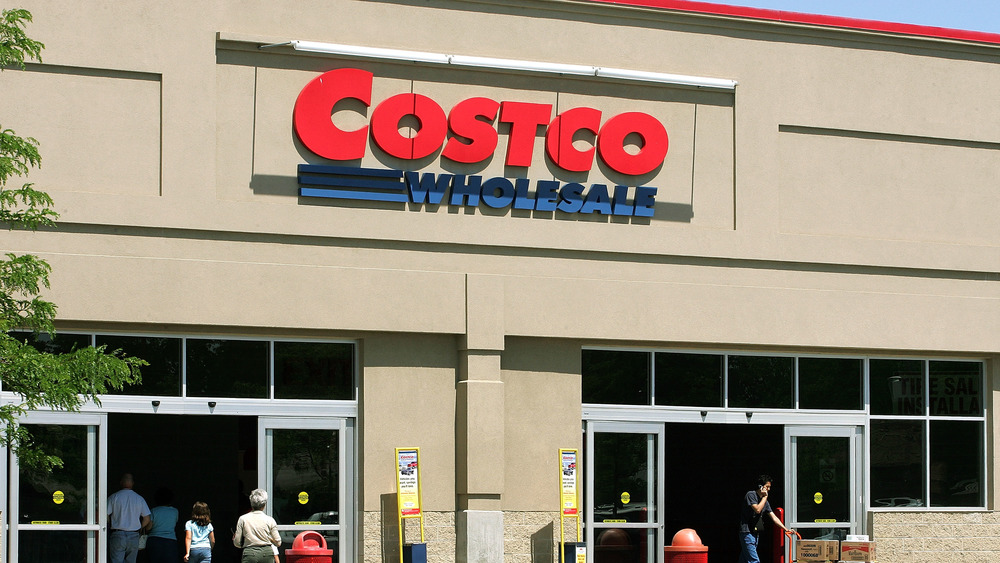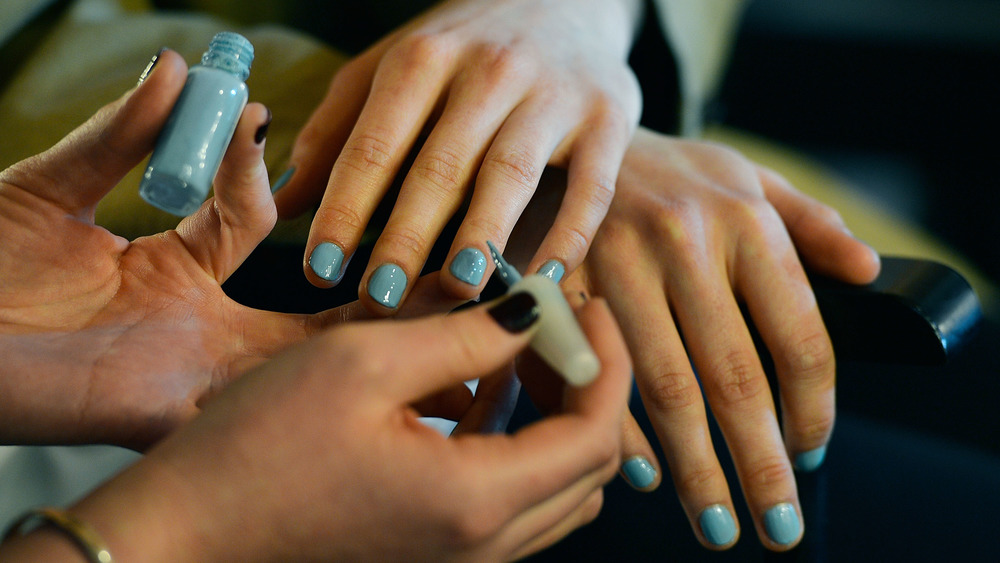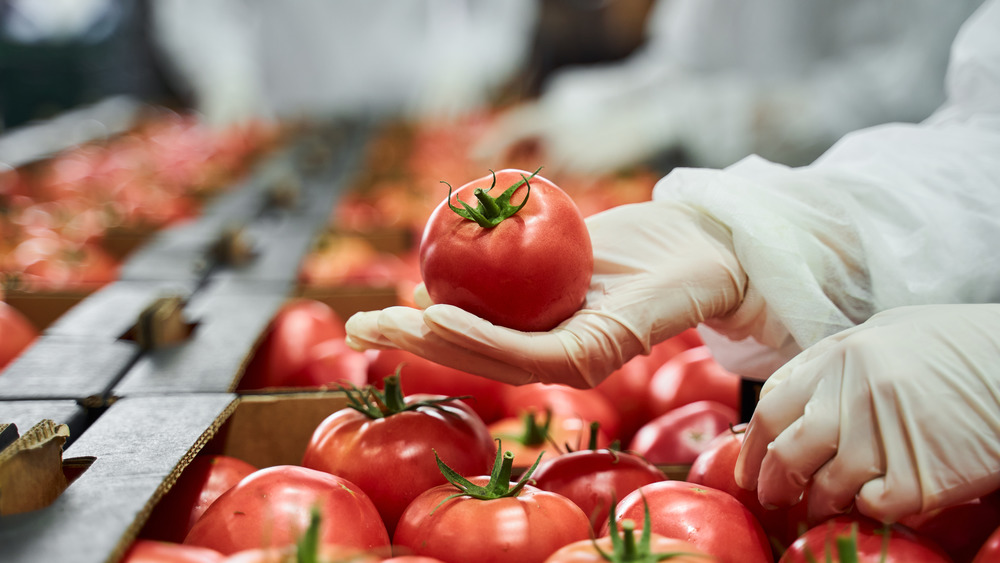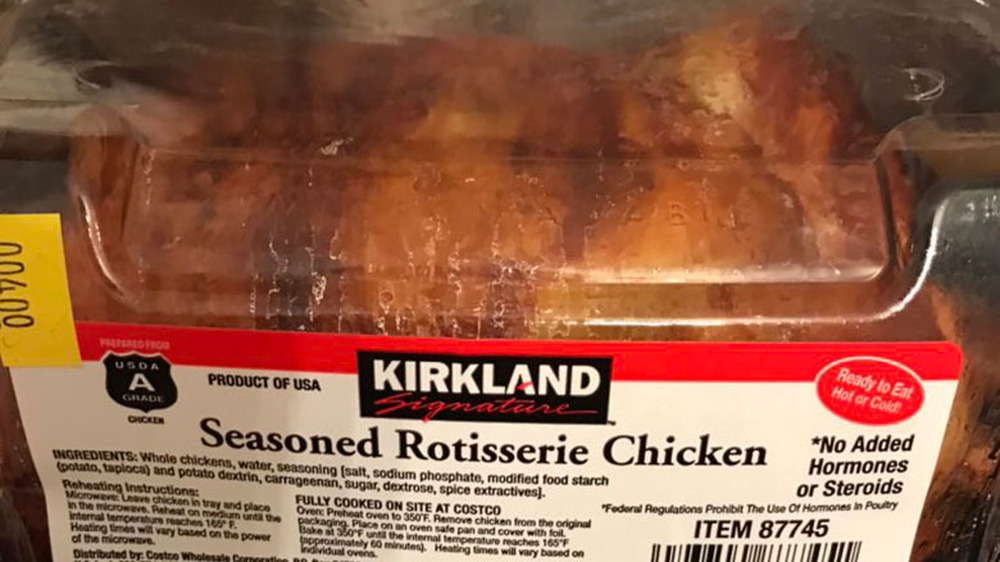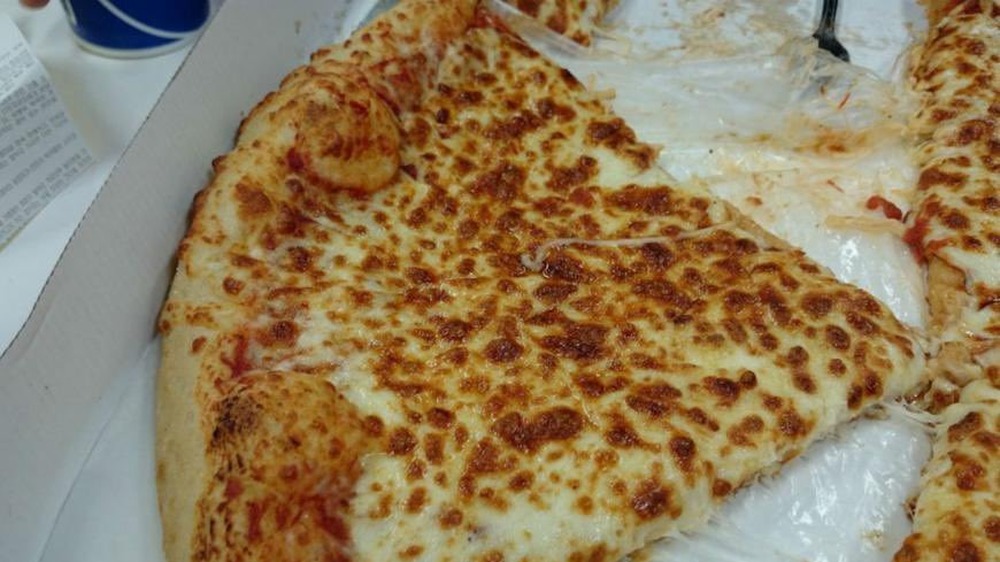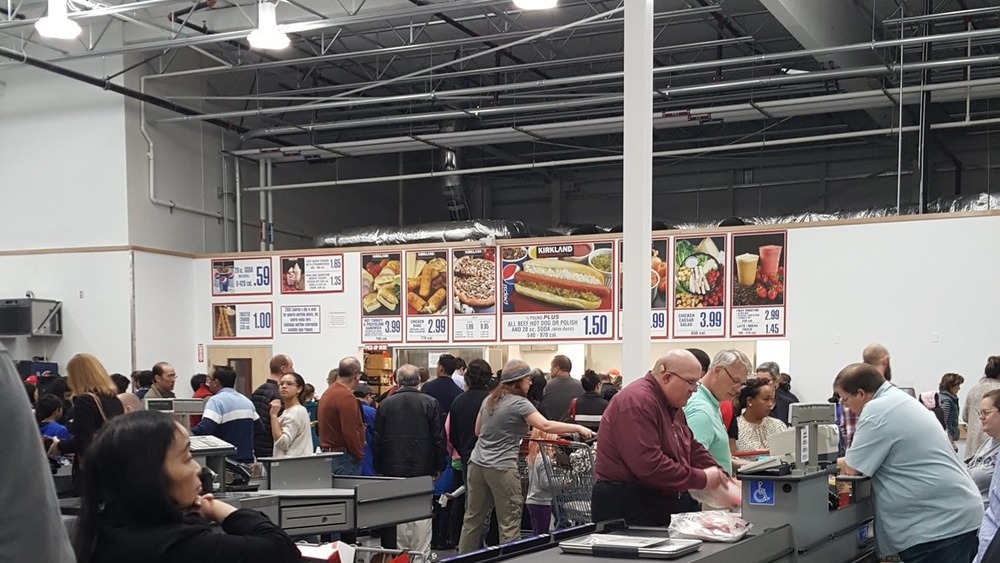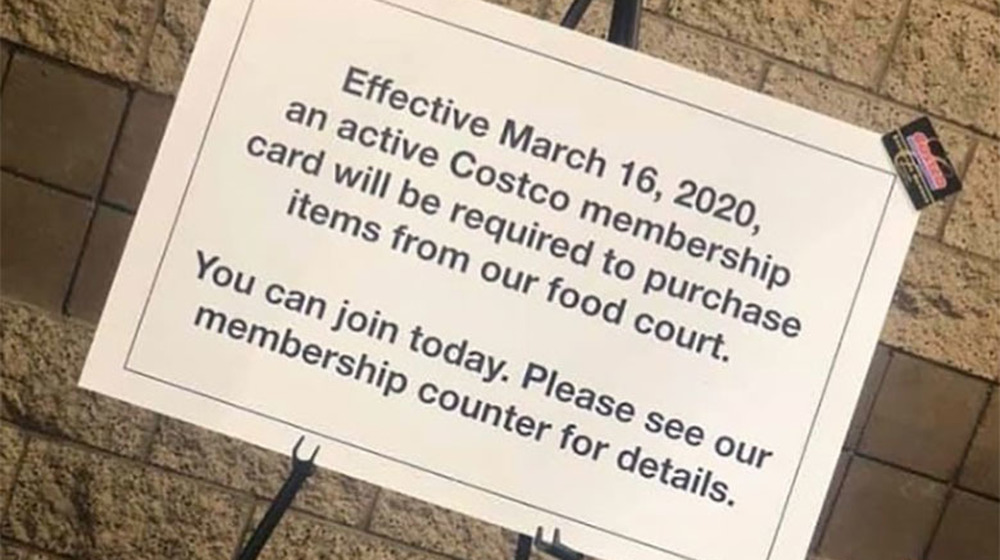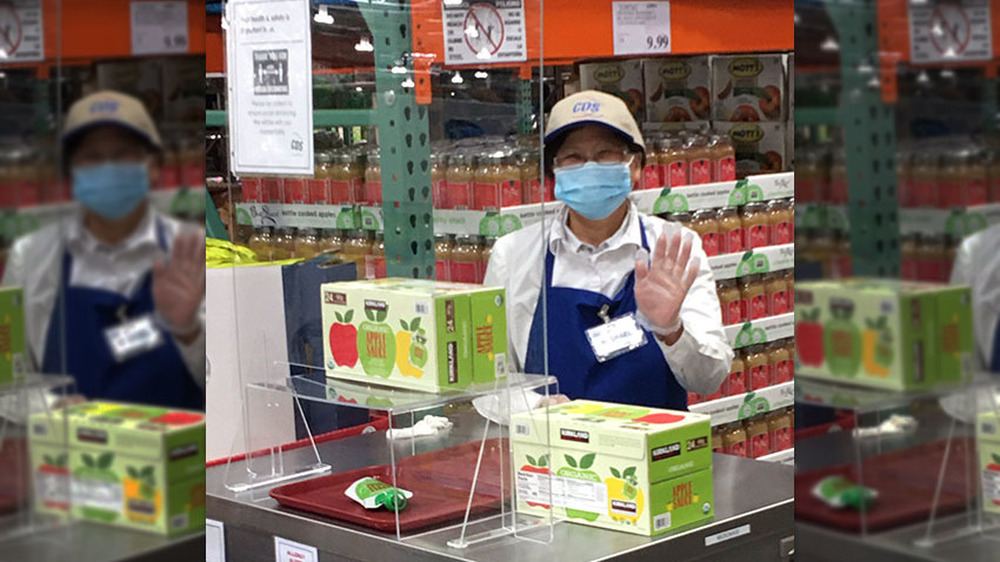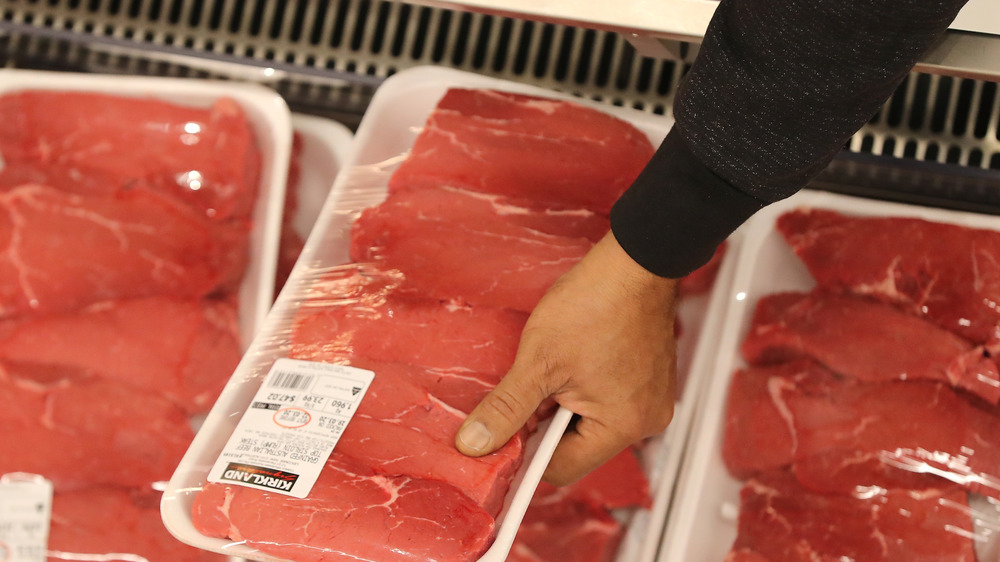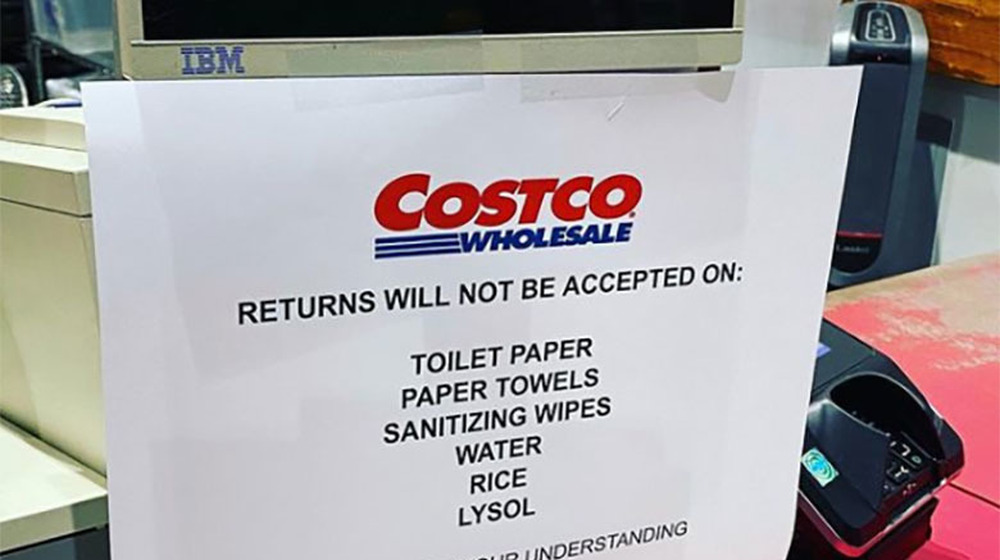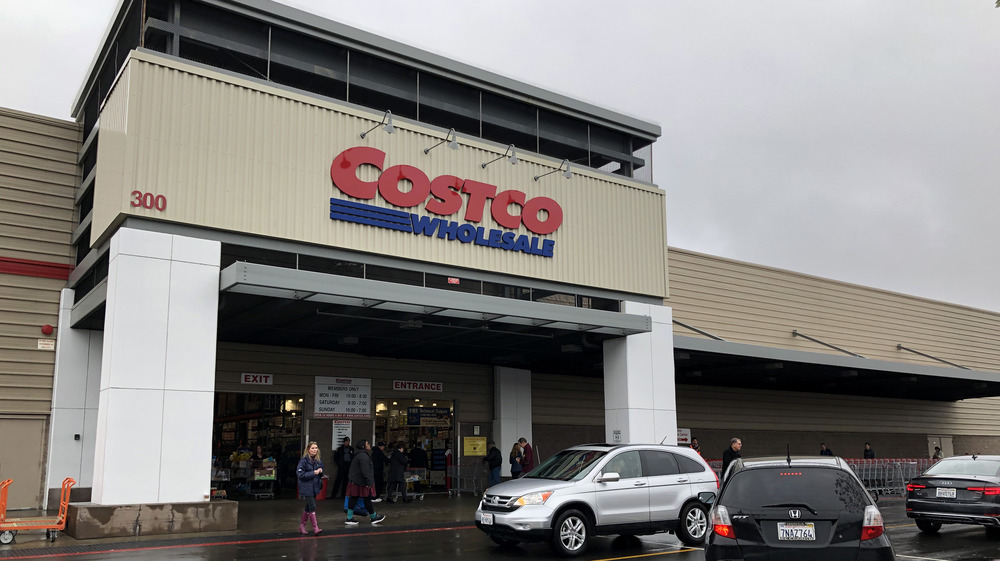Weird Food Rules That Costco Follows
We're no strangers to the ins and outs of Costco here at Mashed. From the items that have cult followings to differences between the food at Costco Australia versus the U.S. and tips for making the most of their sheet cakes, there's a lot to learn about Costco. The retail giant has become synonymous with buying in bulk, and millions of families flock to the stores each week to do their grocery shopping. Anybody need a giant bottle of Kirkland olive oil? Costco's got you covered.
When it comes to making sure all of those popular food products make their way to your plate safely, Costco has a lot of rules. These rules stretch all the way from the vendors who provide the food to the employees dishing out treats at the food court. The standard rules like hand washing are to be expected and are in no way what one might consider "weird." There are some Costco rules in place though that might fit this category, or at the very least, be a little more surprising to customers.
From the do's and don'ts of the food court to who's allowed to eat at that food court and how COVID-19 is shaking things up, consider this your unofficial guide to the rules regarding Costco's food.
Costco food workers have to abide by strict rules regarding their fingernails
Thinking about applying for a job in Costco's food court, bakery, or meat department? Well, if you're a fan of painted nails, you might want to consider another position because a trip to the nail salon is going to be wasted money.
According to Mental Floss, who spoke to Costco employees, nail polish is a no-no for food workers. The primary reason for this isn't that Costco is trying to stifle style but because of the potential for the nail polish to chip and end up in food. That seems like a pretty reasonable argument to us — nothing ruins a bite of pizza like looking down and seeing a chip of magenta nail polish laying on top of a pepperoni. Yuck!
Oh, and in case you're wondering, the same goes for acrylic nails, too. A Costco food safety manual details that employees must have "trimmed and short" fingernails and "no jewelry of any kind can be worn," not even a watch. Other departments within Costco likely aren't as strict about employee appearance. Several Costco employees on Reddit said they got away with sporting facial piercings, but this seemed to depend on how lenient the general manager was.
Costco is serious about clean hands when it comes to food
Nobody wants to eat food that's been touched by dirty hands. It can lead to food poisoning and is just overall rather gross. It's standard practice for employers to require employees to wash their hands before handling food. Costco, however, takes things a step further and has strict protocol in place when it comes to keeping hands clean in regard to any food products that it sells.
Costco expects that its food suppliers have hand washing sinks strategically placed so that food prep employees can wash their hands the second they enter the building and proceed to their work station with minimal risk of germ infiltration. Those hand washing stations should also be completely hands-free, of course, for extra safety. As far as clean hands are concerned, hand washing is only the first step.
If Costco hands are going to be touching any sort of ready-to-eat product, a few squirts of soap simply is not good enough. Employees are to wear gloves and abide by Costco's "written glove policy." The retail chain requires employees to wear either single-use latex-free or reusable gloves, and any reusable gloves must be clean and sanitized before starting a shift or coming back from break.
Costco's rules mean your rotisserie chicken never sits out very long
According to an NPR article, Costco sells some 60 million rotisserie chickens each year. Even though the chickens are a loss leader, they're invaluable because most people who buy them are going to venture deeper into the store and make other purchases. The chickens taste great straight out of the bag, and you're pretty much guaranteed to get a fresh one every time. Yep, just like everything else food-related under the Costco roof, there are certain chicken rules that must be followed.
"Our famous rotisserie chickens are not allowed to be sold after two hours of sitting in the warmer," an employee told Business Insider. Any chickens that aren't sold within the two hour time frame are presumably turned into soup, via the Costco Connection.
The employees who handle those rotisserie chickens can also be seen wearing aprons, gloves, hair nets, hats, and beard nets if they have facial hair. With the $5 chickens being such a big part of Costco's food strategy, it's understandable why they take rotisserie chicken safety seriously.
Some Costco food rules mean wasted food
Walk into any Costco bakery, and you'll see rows of breads, pastries, and cakes, all ready to be sold. So what happens to all that food that doesn't make it off the shelves?
According to the Costco Connection newsletter, food such as baked goods are often donated to food pantries, and rotisserie chickens get recycled into chicken noodle soup. Some produce products even find their way into city zoos or various animal sanctuaries. While it would be great if Costco had a zero-waste record, that's pretty much impossible, and some of the company's food rules actually do create food waste.
A Costco employee named Rachael told Mental Floss that the food court is incredibly strict about throwing away food — even before a customer touches it. According to Rachel: "... let's say a member asks for a slice of cheese pizza. We place that piece onto a plate, with tongs, of course, then place the plate onto the counter. If the member says, 'Oh darn, I've changed my mind, I'd rather have pepperoni pizza,' then we have to toss the pizza that they didn't want into the trash." The customer doesn't even have to touch the plate, as Rachel explained, "Once it hits the counter, it can't come back."
We're not faulting Costco here — gambling with food safety isn't worth the risk. It's that sort of customer indecisiveness that contributes to food waste, though — so choose wisely.
The Costco food court can be a testing ground for new employees
Costco's food court is a serious money-maker. According to CNN, those hot dogs and popular rotisserie chickens that shoppers love to buy help the food court pull in nearly $1 billion annually for Costco. Considering that the food court is a money-making machine, it's only natural that Costco would be serious about its food court safety. Some Costco employees on Reddit believe that the chain uses the food court as a testing ground for new employees to see if they have what it takes.
"If you start in a food department, especially Food Court, Bakery, Deli, etc., it is hard to get out as none of these departments are remotely 'easy' to work in (turnover is usually a bit higher) and they will be less likely to move you out if you are a good worker," one employee said.
Another employee said that newbies either "either start out pushing carts or food court" before going on to describe it as a sort of sink-or-swim situation. "Hang in there, pass your 90 days, and reap the benefits. Look for job postings in the break room. I went food court, to cashier, to membership in a year and a half," the employee advised.
Only Costco members can indulge in the food court
Whether you're grabbing a slice of pizza, a burger, or trying to be healthy and scooping up one of their açaí bowls, the Costco food court has something for everybody. Considering that the Costco food court has so many items, it's no surprise why it's incredibly popular. It's also understandable why a new food court rule was so upsetting to Costco food court fans.
In February 2020, The Kitchn reported that Costco would be implementing a new rule that made the food court off-limits to non-Costco members. A sign captured outside one Costco said that on March 16, 2020 "an active [$60] Costco membership card" would be required for making food court purchases. It used to be that anybody could stroll into Costco off the street and grab a churro or frozen yogurt without a membership — but no more (via Los Angeles Times). "Costco requiring an active membership to buy food from their food court is classist," said one angry food court fan on Twitter.
Here's the thing though, this food court rule may have always been in place and was simply never being enforced. A lot of Costco food courts can be accessed from outside the store, and a Costco customer service rep told Fox Business that the rule was simply "hard to enforce" for this very reason. Either way, that slice of Costco pizza is now a lot more expensive.
The coronavirus put the brakes on Costco's free food samples
Like every grocery store in the United States — and much of the world — the COVID-19 pandemic threw Costco through a loop. All of a sudden, normal operations came to a halt, and a whole new set of rules had to be put into place. This was especially apparent when it came to food and drink.
At the end of March 2020, Costco temporarily did away with its food sample servers out of concern regarding virus transmission (via Mashed). Having potentially hundreds of customers a day grabbing free pretzel bites understandably seemed too risky. Rather than simply tell those sample servers to take a hike, Costco kept them around to help with cleaning efforts. According to the Chicago Sun-Times, when Costco did finally bring back the popular free food samples in June 2020, there were some new rules in place, obviously.
Rather than offer food items like freshly made meatballs, the free samples would only be packaged items kept behind a protective plexiglass shield. It might not have been the free food extravaganza that Costco shoppers were used to, but it was something Don Dohanyos, president of Costco's Club Demonstration Services, said was necessary "to make sure we are taking the right steps to engage members safely."
Costco follows other coronavirus-related food rules
It wasn't just the stop and reintroduction, with new rules in place, on free samples that caught shoppers off guard when the COVID-19 pandemic hit. One of the tell-tale signs that we had entered a new normal in the early months of the pandemic was the absence of certain grocery items in stores. First it was toilet paper, then foods like bread and even yeast. It wasn't just panic buying that impacted grocery stores like Costco but the production of those foods and products.
Meat processing plants slowed production in the early months of the pandemic, and this led to fewer items finding their way to grocery shelves. Costco shoppers who entered stores in May 2020 were met with new rules that limited the amount of meat they could buy. Whereas pre-pandemic, a shopper could stock up on a month's worth of beef, shoppers could now only purchase three products of beef, pork, or poultry at a time (via CNN).
There were also rules about what Costco shoppers could bring into the store. A Costco regular on Reddit said a manager told them they couldn't walk around the store with the iced mocha they'd purchased from the outdoor food court. Another shopper informed them that the policy was most likely put in place to reduce the risk of transmission from shoppers constantly removing their face masks to nosh on snacks. Yes, mochas are delicious, but are they worth the risk of spreading COVID? Nah.
Costco's rules on returning food are actually pretty lax
Costco may have a lot of rules in place in regard to how its food is prepared, sold, and even consumed in the store, but when it comes to food returns, it's almost anything goes — or at least it used to be. The chain's lax return policy has become somewhat of a Costco trademark, and this has led to people returning all sorts of food products that most grocery stores would balk at taking back. The craziest items that people have returned to Costco have been well-documented and include everything from "liquified watermelon" to frozen fish that was over a decade old.
Yes, Costco used to have almost no rules when it came to shoppers returning items, but customers had been abusing that policy for years. While the chain may have wanted to pull the memberships of frequent return policy abusers before, but it was the pandemic that really put Costco's no-rules return policy on the chopping block.
In December 2020, Delish reported that Costco was putting its foot down regarding certain items that people had hoarded and now wanted to return. Among non-food items like toilet paper and Lysol, Costco was no longer accepting returns on water or rice. As for the current company rules on returning a garbage bag of liquified watermelon ... just please don't.
Even with all of its food rules, Costco hasn't completely avoided food poisoning mishaps
The whole point of Costco's rules regarding food, of course, is to avoid selling its customers contaminated products. A food poisoning scandal can cost a company millions in lawsuits and lost profits due to customer distrust. Even with the strict protocol Costco has in place for its employees and vendors, a few food poisoning episodes have slipped through the cracks.
For example, in 2011, at least 20 people fell ill after eating bad cantaloupe, and many of those folks bought the fruit from Costco, reported The New York Times. While the fruit was traced back to a farm in Guatemala owned by produce giant Del Monte, the incident no doubt led to concerned Costco shoppers skipping over the melons on subsequent shopping trips.
Then, in 2018, Costco was hit with a lawsuit by a woman who alleged some bad chicken salad she had purchased led to E. coli poisoning and ultimately led to her requiring a kidney transplant. The Associated Press reported that Costco and the woman eventually reached an undisclosed agreement. Avoiding this sort of thing and the financial fallout that can follow, though, is exactly why Costco means business when it comes to food safety rules.
